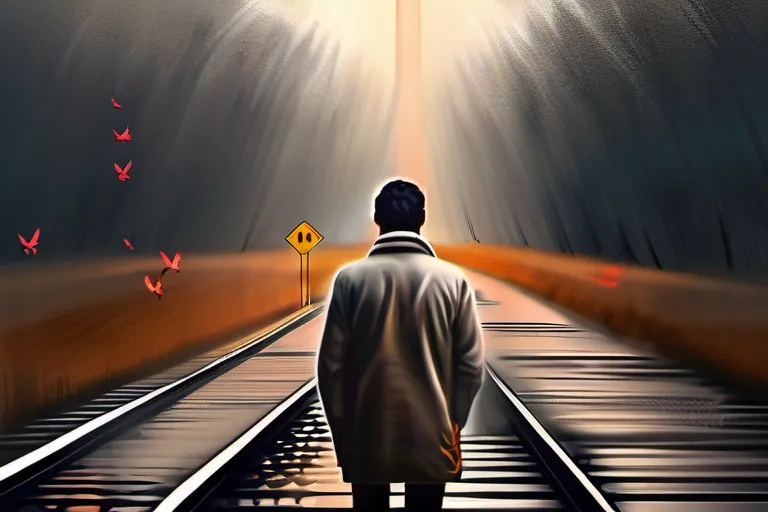Explore the complexities of religious faith, its nature, and whether it is truly a choice.
Religious faith has been a central aspect of human society for thousands of years. However, the question of whether religious faith is a choice or an inherent part of one’s identity remains a topic of ongoing debate. In this article, we delve into the intricacies of religious faith and examine both sides of the argument.
The Nature of Religious Faith
Religious faith, much like the air we breathe, seems to be both omnipresent and elusive. How can something that influences our lives profoundly remain so mysterious? Let’s delve into its definition, origins, and historical context to understand more deeply what religious faith truly is.
Firstly, how do we define religious faith? Is it merely a set of beliefs in deities or spiritual beings? Or does it go beyond that, encompassing practices, rituals, and moral codes that shape our daily lives? The definition can be complex because religious faith often intertwines with culture, history, and personal experiences.
The origins of religious faith are as ancient as human civilization itself. From the caves where early humans painted their stories to the pyramids where pharaohs were entombed, these structures speak volumes about our spiritual quests. But how did this journey begin? Was it a conscious decision or an inevitable part of humanity’s evolution?
Looking at history, we see various epochs that have shaped religious faith in profound ways. The Axial Age (800-200 BCE) saw significant philosophical and religious developments across the world, giving rise to concepts like the Golden Rule and the concept of the divine within oneself. How did these pivotal moments impact our understanding of faith? Were people then making conscious choices about their beliefs or were they simply following a path laid out by societal norms?
One might argue that religion provided a framework for order in chaotic times, but could it also be that this framework was itself a product of human ingenuity and choice? As we explore these questions, the nature of religious faith becomes clearer: it is not merely a passive acceptance of beliefs but an active engagement with the world around us. It reflects our aspirations, fears, and hopes as individuals and communities.
So, in this vast tapestry of human experience, where does religious faith stand? Is it a choice, or is it something that happens to us? The answers are perhaps not black and white but a rich, nuanced gray that deserves careful examination. As we continue our journey through the complexities of religious faith, pondering these questions will undoubtedly enrich our understanding.
Religious Faith as a Choice: The Argument for Free Will
When we delve into the question, ‘Is religious faith a choice?’, it’s like asking if you can choose to fall in love. Just as our hearts often lead us down uncharted paths, so too does our spiritual journey. Some argue that religious faith is simply a consequence of free will—much like choosing between different flavors at an ice cream shop. But is this choice really as simple and straightforward as picking vanilla or chocolate?
Imagine life as a vast ocean, with each individual boat navigating its own path. For some, the seas are calm, making their spiritual journey smooth; for others, storms rage, testing the strength of their faith. In both cases, they choose to sail, guided by personal convictions and beliefs. Could it be that this choice is more about recognizing and embracing what already exists within us rather than something we actively select?
The concept of free will plays a significant role here. If you have the freedom to choose your beliefs, does this mean you can also choose not to believe? Or are these beliefs part of who you are, like the color of your eyes or the depth of your personality? Some might argue that while we may choose which path to follow, it is not a choice to exist in a state of faith at all. Yet, if faith is a personal and deeply felt belief, does that not imply a conscious decision?
Moreover, consider the notion of ‘choice’ itself. Is choosing between different religions any different from choosing your career path or lifestyle? Each option offers its unique set of values and beliefs. Just as you might choose to pursue a career in medicine over teaching, so too can one choose Christianity over Buddhism based on personal resonance and understanding.
But what about those who are born into certain faiths without question? Is their belief not a choice but rather a cultural inheritance? While it’s true that environment plays a significant role in shaping our beliefs, does this negate the element of free will entirely? Can someone truly be ‘born’ into a belief when they also have the capacity to question and explore other paths?
In essence, the argument for religious faith as a choice hinges on recognizing both the freedom of will and the inherent desires within us. It’s about understanding that while our beliefs might be influenced by external factors, ultimately, we have the power to choose how we interpret these influences. Just as you can choose to paint your house blue or red, so too can one choose their religious faith based on personal conviction.
Religious Faith as an Inherited Belief System
Is religious faith simply a choice, or is it more deeply embedded within us? Some argue that our religious beliefs are not a conscious decision but rather an inherited belief system passed down through generations. Could it be that we’re born into a particular religion because of where and how we were raised?
Imagine religious faith as a river, winding its way through the landscape of human history. Just like a river forms over time, flowing through mountains and valleys, shaping the land around it, our beliefs form through the cultural landscapes in which we grow up. Are we just following the path of least resistance, or do we have any real control over where that path leads?
Consider this: if religious faith were truly a choice, wouldn’t people from the same family or community always share the same beliefs? But we see diversity even within families and communities, suggesting that factors beyond personal choice play a significant role. Is it possible that our environment and upbringing are so influential that they almost determine what we believe?
Think about a child growing up in a deeply religious household. From an early age, they hear stories, attend services, and learn the values of their faith. Could this constant exposure be shaping their beliefs without them even realizing it? How much choice do they have when the world around them is constantly reinforcing one perspective?
Religious faith as an inherited belief system could explain why people from similar backgrounds often share similar views. It’s like a seed that sprouts in soil, growing into what the conditions allow. If we are truly just choosing our beliefs based on free will, shouldn’t there be more diversity among those raised in the same environment?
But let’s not forget the power of individual choice either. While our initial exposure might shape us, doesn’t this suggest that we still have the ability to question and change our beliefs? The idea that faith is an inherited belief system does not negate the possibility of personal growth and transformation.
So, when you reflect on your own religious journey, did you consciously choose every step, or were there moments when external influences played a significant role?
The Role of Environment and Culture in Shaping Religious Faith
The environment and culture surrounding us are like invisible architects, shaping our beliefs and values from the very first moments of life. Have you ever wondered why some people grow up in one religious tradition and others in another? Is it simply a matter of where we’re born or do deeper forces at play influence our spiritual journeys?
Environment and culture can be seen as the fertile soil in which religious faith takes root. Just as a tree needs specific conditions to flourish, so too does our spiritual growth depend on the nurturing environment around us. In some cultures, religion is deeply embedded in daily life, making it nearly impossible to avoid its influence. In others, it may be more of an afterthought or a choice.
Think about it: are you like a seed scattered by the wind and planted wherever fate decides? Or do your roots dig deep into a specific culture that defines much of who you are? The environment we grow up in sets the stage for our spiritual plays. It influences not just what we believe, but how we think about morality, ethics, and even our understanding of the world.
Culture also shapes the lens through which we view religion. Are you part of a society that celebrates diversity, where different religions coexist side by side? Or are you in a place where one dominant faith is pervasive, creating a homogenous religious landscape? In both cases, your beliefs will be influenced not just by what you learn from books or sermons but also by the social and cultural norms around you.
So, when we talk about religious faith as something that’s shaped by environment and culture, it’s like saying our spiritual growth is a collaborative effort between us and the world around us. It’s not just about what we choose, but how the world presents itself to us. Is your faith deeply rooted in the traditions of your ancestors, or does it flourish in the modern secular world? The answer might lie in the unique blend of environment and culture that has molded you.
This chapter underscores the importance of understanding our cultural context when exploring the nature of religious faith. It’s a reminder that while we can make choices, those choices are often heavily influenced by the world we live in. Just as a river carves its path through the landscape, so too does culture shape and direct our spiritual journeys.
The Impact of Personal Experiences on Religious Faith
Have you ever wondered how personal experiences shape our religious faith? It’s like planting seeds in a garden, where each miracle or spiritual encounter acts as a unique seed, growing into a profound understanding of one’s beliefs.
Imagine two individuals who grew up in the same community, yet their journeys to faith are vastly different. One might have experienced a miraculous healing that solidified their religious convictions, while another found solace and peace through a deep theological study. How can both experiences be true if they lead to such diverse paths?
Consider the metaphor of a river: it flows through various landscapes, encountering rocks, bridges, and vast expanses, each shaping its course. Similarly, our personal experiences act as these elements, guiding us through life’s journey and influencing our religious faith.
What about those who have faced profound crises or loss? Do their traumatic experiences shape their faith in a different way than someone who has lived a more stable life? Can we say that the latter lacks the depth of spiritual growth because they haven’t experienced adversity?
These questions delve into the heart of our individual journeys, questioning whether religious faith is a choice or an inevitable part of our personal narrative. Just as a tree’s roots are deeply embedded in the earth, providing stability and nourishment, our personal experiences anchor us to our faith, making it a vital part of who we are.
So, can we truly separate our personal experiences from our religious beliefs? Are they not intertwined, like the threads that weave together the fabric of our lives?
In exploring these complexities, we find that while environment and culture play significant roles in shaping our faith, it is ultimately our personal experiences that give our religious journey its unique flavor. Each experience, whether a joyous revelation or a challenging moment, contributes to the rich tapestry of our spiritual life.
Balancing Free Will and Destiny in Religious Faith
Is religious faith a choice? Or is it something we inherit from our families, like a family name or a favorite color? The tension between free will and destiny in religious faith often leaves us pondering these questions deeply.
Imagine standing at the edge of a vast ocean, waves crashing against the shore. You see others wading into the water, some hesitantly, some with confidence. Do you decide to join them, or do you stay on the beach? This scenario mirrors the decision-making process many people face when considering religious faith.
But here’s a twist: Some religions believe in predestination—where every step we take is predetermined by a higher power. If this is true, does choosing to follow a religion mean anything at all? Is it just going with the flow of destiny or making a conscious decision?
Consider the metaphor of planting seeds. A child may inherit a garden from their parents, but they choose which seeds to plant and how to tend to them. Similarly, some argue that religious faith is a choice we make after being exposed to certain teachings and values.
Yet, others hold fast to the belief that our spiritual journey is predetermined by divine will. This perspective might lead one to wonder if there’s any real choice involved in accepting or rejecting religious beliefs. If everything is destined, does free will even exist in the realm of faith?
The balance between free will and destiny in religious faith is complex and multifaceted. It invites us to reflect on our own paths and decide where we stand. Are we mere spectators in a grand cosmic drama, or are we actors with the power to choose our roles? The answer might lie somewhere in between these extremes.
Conclusion
 Ultimately, the answer to whether religious faith is a choice may depend on individual perspectives and experiences. Regardless, understanding the nuances of religious faith can foster greater empathy and tolerance in our increasingly diverse world.
Ultimately, the answer to whether religious faith is a choice may depend on individual perspectives and experiences. Regardless, understanding the nuances of religious faith can foster greater empathy and tolerance in our increasingly diverse world.











